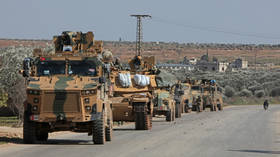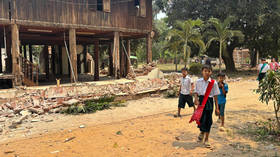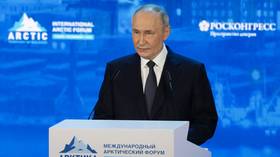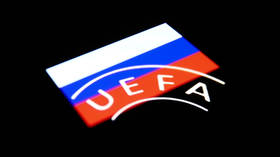‘War of nerves’: Turkey goes ‘all-in’ to stop Syrian advance in Idlib but will it end in all-out war?

Tensions in Syria’s Idlib province show no signs of abating, with the Syrian Army pressing the offensive against militants while Turkey still seems to be hell-bent on stopping it. Will the situation boil over into open war?
Recent days have seen another spiral of tensions between Ankara and Damascus over the troubled northwestern Syrian province of Idlib – the last major stronghold of extremists and militants. At least 22 Turkish soldiers deployed to Idlib were killed in an airstrike launched by the Syrian Air Force on Thursday, according to Ankara.
President Recep Tayyip Erdogan had earlier issued an ultimatum to the Syrian Army, demanding it retreats from Turkish observation posts in Idlib by Sunday. A spokesman for his AK Party said that the Turkish Army is ready to step in as soon as the deadline set by Ankara expires.
Also on rt.com 33 Turkish soldiers confirmed killed in Idlib airstrike as Erdogan chairs emergency meeting on SyriaBut the Syrian Armed Forces, which are still engaged in fierce clashes with militants that include an Al-Qaeda affiliate, clearly have no intention of pulling back. The troops loyal to Damascus continue to liberate cities and towns in the south of the province in their quest to take back a strategic highway linking the nation’s second most populous city of Aleppo to the major port and the capital of the western coastal province of Latakia.
The tensions put Russia, a Syrian ally and Turkey’s close partner, in a precarious position, and pose a potentially increasing challenge to Ankara’s NATO allies. So could the looming Turkish operation be a harbinger of a greater disaster?
Risky games
Ankara has apparently decided to escalate almost to the point of no return. Yet analysts believe this does not necessarily mean that Turkey wants an all-out war. Idlib is of “utmost importance” to Erdogan, said Ruslan Mamedov, a Middle East analyst from the Russian International Affairs Council (RIAC), a Moscow-based think-tank.
Also on rt.com ‘We’re the hosts there’: Erdogan says Turkey won’t pull back from Syria’s sovereign territory, gives Assad ultimatum to retreatOn the ground, however, the cards appear to be stacked against pro-Turkish militants that are being driven away by the Syrian Army.
“We can talk about the tactics but strategically it is clear: the Syrian government is restoring its sovereignty and regaining control over the nation’s territories,” Mamedov told RT.
That puts Turkey in a difficult situation, since Erdogan cannot just back off and make concessions for internal political reasons, ‘Russia in Global Affairs’ Editor-in-Chief Fyodor Lukyanov explained. “Turkey believes that status-quo in Idlib should simply be preserved in the foreseeable future while Damascus, supported by Moscow, thinks that Ankara demonstrates its inability to achieve de-escalation through agreements [with the militants] and opted for a military solution.”
Syrian military reinforcements convoy heads towards #Idlibpic.twitter.com/oW00yF0Urq
— RT (@RT_com) February 22, 2020
The situation is thus balancing on a knife edge since Turkey has gone “all-in,” Lukyanov warns. However, Mamedov believes that the goal is not to start a war but to “provoke Moscow into some sort of reaction” and potentially to get a stronger position in negotiations.
The risks of such a policy are high. As Turkey has beefed up its presence in Idlib, Moscow has accused it of supporting the militants with heavy artillery. The clashes have already led to casualties both on the Turkish and the Syrian side. Although none of the incidents have resulted in any drastic measures so far, further escalation could put Ankara on the brink of a conflict with Moscow, Mamedov believes.
“There is a risk… that could make Russia actively join the conflict and that is the risk of a Russian plane being shot down. The Turks already deployed air defense systems to the war zone.”
A Russian Su-24 bomber shot down by a Turkish F-16 jet during an anti-terrorist sortie in 2015 led to a major crisis in relations between Moscow and Ankara, although the two nations managed to avoid a further military escalation and then worked to mend their ties.
Sticking to the rules
The situation appears tense, but it is also clear that both Ankara and Damascus are trying to keep it from spiraling out of control and turning into a bloodbath. While the Syrian military say they are routinely being targeted by the Turkish tanks and artillery backing up the militants, they have not moved to destroy them.
“They try not to take any radical steps. Turkey’s observation points are still intact, although many of them have already been surrounded by the Syrian Army. The sides are seeking to avoid a 'free-for-all' game,” Mamedov explained.
#Idlib Battle Rages: #Syria launches counterattack against Ankara-backed militants near Nayrab pic.twitter.com/vaqythYwiq
— RT (@RT_com) February 22, 2020
The risk of conflict between NATO’s second largest army and a nuclear armed UN Security Council permanent member is also apparently acting as a deterrent in this situation. “It is easier for Ankara to strike a deal with Moscow rather than to push for further escalation,” the RIAC analyst told RT.
Lukyanov also believes that the sides would attempt to mitigate the risks of a potential standoff.
“When it comes to Syria, Russia and Turkey turn out to be mutually dependent to a point, where Turkey could not achieve its goals without Russia... but Moscow would also find itself in a difficult situation facing an opposition from Ankara,” he said.
A “sort of an agreement” between Russia and Turkey is almost inevitable, Lukyanov argued. “The conflict would most likely be frozen, there would be new lines [of contact].” He added that Moscow could agree to a sort of a buffer zone along the Turkish border – a similar one that was created in the part of northeastern Syria previously held by Kurdish militias.
What is happening now is a war of nerves, not a pathway to a direct confrontation.
NATO unlikely to intervene
Erdogan recently said that he asked the US for help in Idlib, but so far he has received none. This fact apparently did not discourage Ankara from trying to involve its NATO allies in the Syrian mess, as the Turkish president said there could be more meetings on the issue.
The analysts believe that Turkey will most likely have to go it alone. The US military have already branded Idlib a terrorist safe haven, Mamedov said, referring to a comment of Operation Inherent Resolve spokesperson Col. Myles Caggins made to Sky News. That makes their interference on behalf of Turkey unlikely, he believes.
Also on rt.com Turkey faces strategic defeat in Idlib after failing to live up to its commitments on Syria“Even in case of an open confrontation between Turkey and Russia, the Americans would not have serious reasons to intervene, as well as NATO. After all, it is not an attack on the Turkish territory.”
Lukyanov believes the alliance would mostly limit itself to demonstrations of solidarity with Ankara, but would hardly go any further.
“They would wait until the situation resolves. They just need to show they are on the side of their ally without engaging in a conflict that could lead to serious consequences for the entire alliance,” he told RT.
Subscribe to RT newsletter to get stories the mainstream media won’t tell you.












